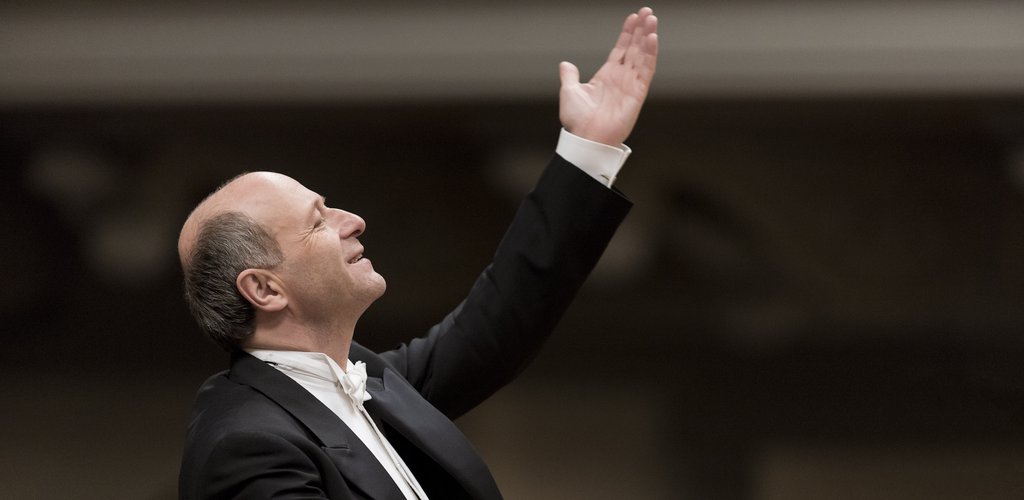The visit by Iván Fischer and his Budapest Festival Orchestra is always an event, as the conductor often defies expectations to deliver an unexpected performance. He places singers among musicians; he invites audience to sit among musicians. His orchestra sings its encore without instrumental accompaniment. Without any fanfare, Fischer strives to bring classical music closer to the audience. One detects a ubiquitous joy of making music among his mostly Hungarian members as they follow their leader. They are exceptional musicians. Critical review by Ako Imamura, Bachtrack.
For the two concerts at Carnegie Hall devoted to Béla Bartók, the double basses were placed on a low platform at the back of the stage, next to the percussion. The woodwinds were more forward and central, in front of the basses. One could experience the prominence of the woodwinds in Hungarian music, crisp and clear. That was a fitting arrangement for the second evening, which was an exposition of Hungarian and East European folk music as was recorded by Bartók and his colleagues, and its lasting impact on one of Bartók’s masterpieces, Bluebeard’s Castle. Fischer gave the audience an introduction to the history of Hungarian music, an important context of the main event.
The concert began with a reduced orchestra performing the Romanian Folk Dances, seven short dances played without a break. Three orchestral members played the original folk music on violin, viola and bass first, to set the mood. The traditional Hungarian Peasant Songs that followed featured folk singer Marta Sebestyén, who played a flute and sang an extended solo accompanied by this string trio. The orchestra then took over, the music alternating between simple and plaintive folk melodies played by woodwinds and full, sweeping melodies dominated by strings. Orchestral members even jumped in to sing at times.
As enjoyable as the first half was, the evening’s focus was Bluebeard’s Castle after the intermission. It was an astonishing and breathtaking performance, hands down the best representation of all that Bartók brought to the fairy tale couched in the musical language of his native Hungary with its centuries of tradition. Fischer himself gave the spoken introduction from the podium. He conducted with marvelous, precise control of volume and tempo. Yet the whole performance was organic and smooth; there was not a moment of slackness or any dull patches. Fischer restrained his large orchestra during the first part of the piece, as Judith, Bluebeard's bride, insisted on learning about the secrets of his castle... and perhaps his soul. The castle’s torture chamber, armory, treasury, and a secret garden, were all revealed in quiet menace as the woodwinds dominated, playing the dissonant chords with increasing anxiety and urgency. When the fifth door is opened – revealing Bluebeard's kingdom – the music acquires brilliance and grandeur. Even this relief from the incessant brooding mood was tinged with weary caution under Fischer’s guidance. By the sixth door, the pool of tears, the music acquired a sense of quiet resignation. The performance ended with a hush that was not broken for many seconds.
It was a pleasure to experience the challenging roles of Judith and Bluebeard sung by Hungarian singers of superb technique and musicality. Mezzo-soprao Ildikó Komlósi, a veteran of the role (this was her 165th Judith), retained her warm, rich and potent voice that cut through the heavy orchestra. She lacked steadiness in her voice as wobbles crept in when she pushed it, but that suited Judith's increasingly unsteady character. Above all, her Judith was at once naive, seductive, suspicious and desperate. She brought subtle and remarkable nuance to the character, a masterclass of characterization with voice.
The bass Krisztián Cser, is much younger and yet is already an accomplished Bluebeard. His was a melancholy character not willing to reveal much about himself. When Judith forced him to open the doors of his castle, his response to her increasing agitation was to maintain his steady and frightening outward calm. Bluebeard’s recitation about his previous wives, whom he praises as dawn, noon and dusk, was delivered in a whispered soliloquy, more frightening than any violent outbursts in its quiet ferociousness.
The evening’s overwhelming impression, aside from the amazing Bluebeard’s Castle, was a strong message from Fischer and his orchestra that art exists as an integral part of human history, a result of a collective memory, to be shared and cherished. That is what makes us human.

